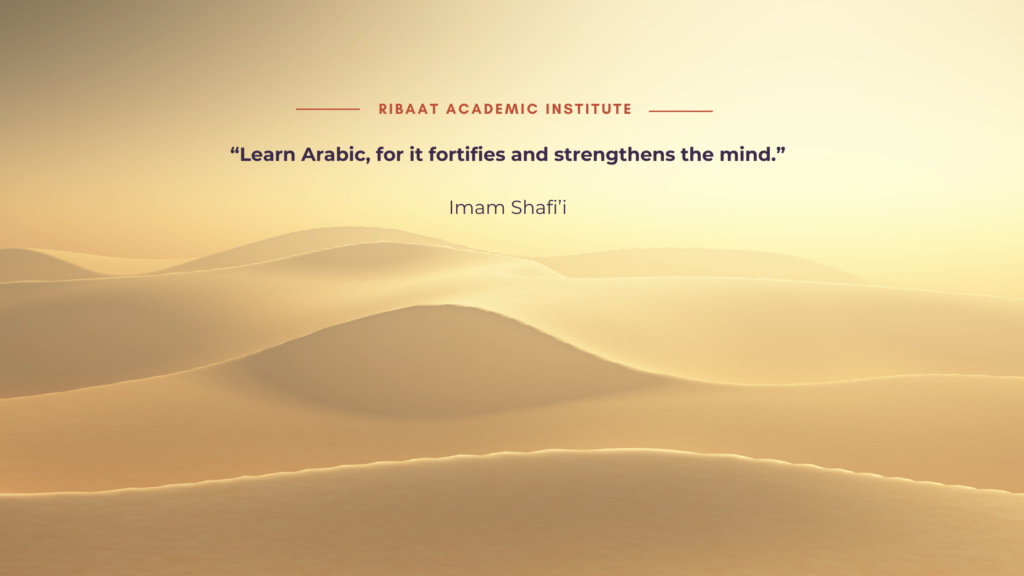“Learn Arabic, for it fortifies and strengthens the mind” was the saying of Imam Shafi’i as quoted by one of his students. Even though Imam Shafi’i was Arab, he went and lived for years with the Bedouins in the desert in order to learn Arabic in its purest form, so that he could understand this religion in the best way.
Some say that Arabic is difficult, but it’s not any more so than any other language. The way that Arabic differs from English in particular is that it is a very structured and logical language. It has many rules but that should not intimidate us, rather these rules are the recipe for success. Once we know the rule, all we have to do is apply it and we are good to go! With English, however, there are so many exceptions to the rules that they almost render the rules redundant!
It should please us to know that just because many of us may not be Arab, that does not mean that we are at a disadvantage with the language or that this language is not for us. I include myself here because I am not Arab, I am actually Indian! Yet here I am, a teacher of Arabic at Ribaat, and I also hold an ijaza (license) in Tajwid. Well, if I can do it, you can too!
The first person to ever codify Arabic grammar and write a book on it, was a man called Sībawayh who lived In the 700s. He was the first to produce a comprehensive encyclopaedic book on Arabic grammar, in which he set down the principles and rules of Arabic grammar with countless examples taken from Arabic sayings, poetry and prose. But guess what, he was Persian! This language that he became an expert in, so much so that he has been called the greatest of all Arabic linguists and one of the greatest linguists of all time in any language – this language was not his mother tongue! Also, many of the great names that we rely upon for the details of our religion were not Arabs. Take the famous hadith scholars Imam Bukhari and Imam Tirmidhi for example – both of them were from Uzbekistan! Their not being Arab did nothing to prevent them from becoming masters in the Arabic language and this deen!
The SEBIL Center for Arabic Language in Ramallah, Palestine, has these figures for the number of words in a language:
Arabic: 12.3 million words;
English: 600,000 words;
French: 150,000 words;
Russian: 130,000 words.
That means that the Arabic language has 20 times the words of English! Let’s take just one example that illustrates this clearly – Arabic has at least 11 words for love, some say 24, with each word actually conveying a different stage of love. The word hawā, for example, describes the initial attraction of the soul towards another. The verb hawā/yahwī means to tumble or to fall into something, just as one falls in love.
Then we have ‘alāqa, which comes from the verb meaning ‘to cling on to’. It describes the stage when the heart begins to attach itself to the beloved. After that, love becomes a passionate desire ‘ishq and then an all-consuming feeling shaghaf. Then finally huyām which describes the complete loss of mind, and a person who is hayūm is someone who is mystified.
The most widely known word for love in Arabic, ḥubb, comes from the same root as the word for ‘seed’ ḥabb– showing that it has the potential to grow into something beautiful. You can see for yourself how much depth of meaning is incorporated into each word in Arabic!
Despite the abundance of words in the Arabic language, when you translate a passage of English into Arabic it will take up about half the amount of lines as the English passage because, despite its depth, Arabic is also very concise. In Arabic you can actually have an entire sentence in one word – just add a prefix and a suffix and you have an entire verbal sentence complete with your subject, verb and object in the same word!
We all know we need to learn Arabic, not just because it’s the world’s 5th most widely-spoken language, but for the sake of understanding this religion properly. Learning Arabic unlocks the doors to the linguistic and cultural heritage of Islam, which many Muslim women in particular are distant from. Understanding these meanings can be critical to our livelihoods and relationships with Allah, ourselves, our families, and the ummah.
Of course, there are numerous translations out there, but what translations convey is actually just a fraction of what is being offered. From a linguistic as well as semantic perspective, much of the depth of what the Quran holds can simply not be transmitted through translation.
Allah tells us in many places in the Quran such as in Surah Yusuf (12:2), “Indeed we have revealed the Qur’an in Arabic.” This is because when the Qur’an was revealed, the Arabs had reached such a peak of eloquence in their language that the Qur’an was the ultimate linguistic miracle – not just in its content but in its form, its rhyme, rhythm, its repetition and its style that wasn’t poetry yet wasn’t prose – much of which is completely lost in translation.
Allah says that He revealed this Qur’an in Arabic so that you may use your intellect (Surah Zukhruf) and it is a characteristic of Arabic that it naturally forces you to use your mind. Every word in Arabic is made up of root letters which causes groups of words to be linked to one another in form and meaning. For example the word tadabbara to ponder – it is made up of the root letter d-b-r, which as dubur means someone’s backside, or as dabbara means to manage things. So we are forced to look beneath the actual word to the root letters which offer us extra meaning. So within this word for pondering, we look to the back, i.e. to those things which are not necessarily apparent, and also contextualise and manage our thoughts. When Allah says, “a fa lā yatadabbarūnal- qur’ān” – “will they not ponder over this Quran?” (Surah Muhammad 47:24 ) – then we see what level of reflection Allah wants from us: He wants us to look beneath the lines and contextualise.
Another example of the depth of Arabic is if we look to the word for gold – dhahab. It comes from the root dh-h-b which as a verb means to go/leave, offering us that there is a message that these things will not stay with us forever – when we die, it will leave us!
There is also an overwhelming power that the Qur’anic language has– that same power that caused the Quraysh when they were still disbelievers to fall into prostration when they heard the words of Surah Najm recited to them. May Allah allow all of us to get to that stage where we are able to appreciate the power of the language of the Qur’an.
Ahmed Shawqi, nicknamed the “Prince of poets”, was a famous Arab poet of the 20th century. In one of his poems when describing Arabic he said, “The One who put different aspects of excellence in the different languages, placed beauty and its secret inside of Arabic.”
So I want to invite you to join us on the Ribaat Arabic track. After ten years of teaching experience and seeing what worked and what didn’t for the hundreds of students that have poured through our doors for Arabic, Ribaat has now taken on a brand new approach to language teaching, guided by Dr. Anna-Maria who holds a PhD in Arabic language learning. This new system involves 6 week courses, designed to be short but sweet, focusing on maximising language retention through daily interactive activities so that it is engaging and enjoyable – and at the same time, it works! The beautiful thing is that, as you move through the levels of Arabic, you will begin to make more and more sense of what you are reading and it feels ahhh-mazing!
See you there inshaAllah!
Anse Nishat Lal

